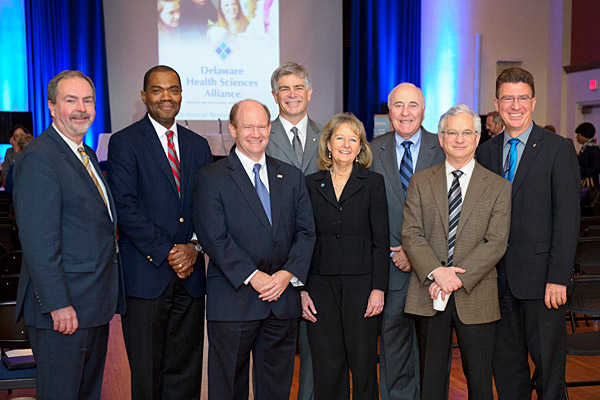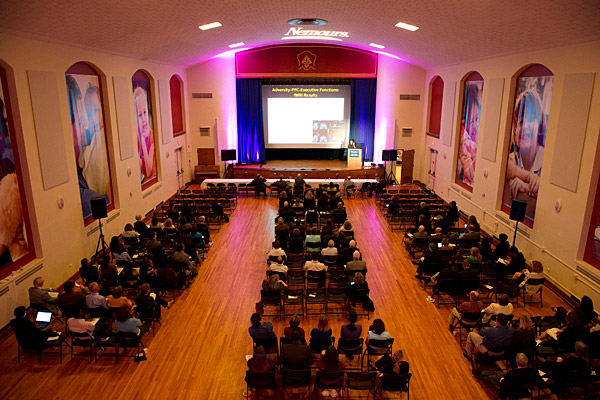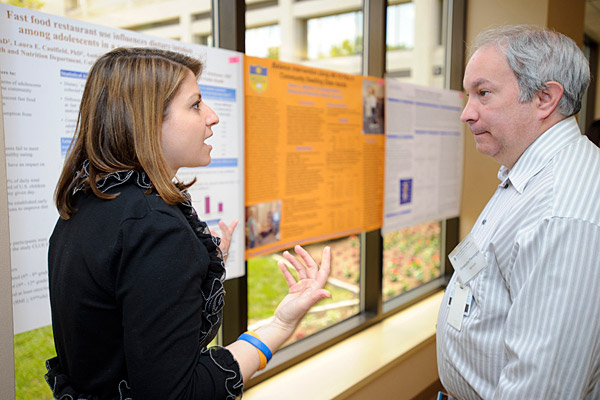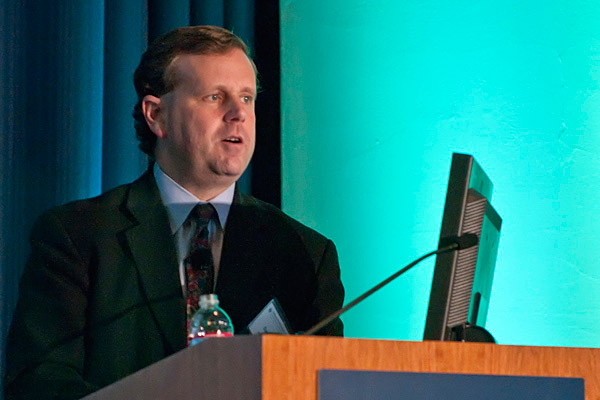


DHSA symposium
Event focuses on building a network for translational research
10:26 a.m., May 21, 2012--Some 200 academic and clinical researchers turned out for the 4th annual Research Symposium of the Delaware Health Sciences Alliance (DHSA) on Friday, May 11. Held at the Nemours/A.I. duPont Hospital for Children, the symposium focused on building a translational research network.
“The DHSA partnership is all about working together to move research from the laboratory to the clinic and the community as quickly as possible,” said Kathy Matt, executive director of DHSA and dean of the College of Health Sciences at the University of Delaware. “So it was very appropriate that the theme of this year’s symposium was building a network to enable that translation.”
Research Stories
Chronic wounds
Prof. Heck's legacy
Harvard University’s David Cutler delivered the keynote address, “The Next Revolution in Health Care.” A national expert in health economics, Cutler is known for promoting policies aimed at increasing the value of medical services and improving health outcomes rather than at cutting costs. He is the author of Your Money or Your Life: Strong Medicine for America’s Health Care System (Oxford University Press).
Cutler predicted major changes in the next decade, including universal coverage, insurance companies becoming less important, and the organization of medical practice becoming very different.
“2014 is sooner than you think,” he said, referring to the impending changes in national health care coverage.
Culprits with the current system, Cutler said, include excess acute and post-acute care spending, poor prevention, and excess administrative costs.
Data organization, retrieval, and analysis will be key in creating what Cutler referred to as “not your father’s health care system.”
The symposium poster session resulted in three projects being recognized with awards:
- "Role of MicroRNA 23b in Colon Cancer Stem Cells," Vignesh Viswanathan;
- "Implantable Three-dimensional Salivary Spheroid Assemblies Demonstrate Fluid and Protein Secretory Responses to Neurotransmitters," Swatti Pradhan Bhatt; and
- "Role of HOX Genes in Regulation of Stem Cell Population in Normal and Malignant Colon Tissue," Seema Bhatlekar.
Two panel discussions, one on aligning community health care needs with academic research priorities, the other addressing the role of IT in a statewide translational health network, brought together experts from the academic and clinical side with leaders of community organizations and the public sector.
In addition, three talks were delivered by alliance representatives:
- "Prostate Cancer as a Model for Translational Research," Lucia Languino, Thomas Jefferson University;
- "Relevance of IT in Clinical Research," William Weintraub, Christiana Care Health System; and
- "Impact of Social and Behavioral Sciences in Medical Research," Mary Dozier, Amy E. du Pont Chair of Child Development, UD.
“Delaware is rapidly building its biomedical research infrastructure through organizations like DHSA and programs like INBRE and COBRE,” said Karl Steiner, senior associate provost for research development at UD. “This state has a great tradition of people working together for the greater good, and in the case of this year’s symposium, we were thrilled to be joined by Sen. Chris Coons, who expressed the support of Delaware’s congressional delegation for the broader goals of the alliance.”
About DHSA
The Delaware Health Sciences Alliance was established in 2009 with four founding partners—Christiana Care Health System, Nemours/Alfred I. duPont Hospital for Children, Thomas Jefferson University, and the University of Delaware.
The alliance enables partner organizations to collaborate and conduct cutting-edge biomedical research, to improve the health of Delawareans through access to services in the state and region, and to educate the next generation of health care professionals.
DHSA’s unique, broad-based partnership focuses on establishing innovative collaborations among experts in medical education and practice, health economics and policy, population sciences, public health, and biomedical sciences and engineering. For more information, visit the DHSA website.
About symposium funding
The symposium was supported by DHSA, the Delaware INBRE, supported under NIH-NIGMS grant #8P20GM103446-12 and through the state of Delaware, and by the Nemours COBRE Center for Pediatric Research, supported under NIH-NIGMS grant #8P20GM103464-08.
Article by Diane Kukich
Photos by Cindy Brodoway, Nemours, and Doug Baker











